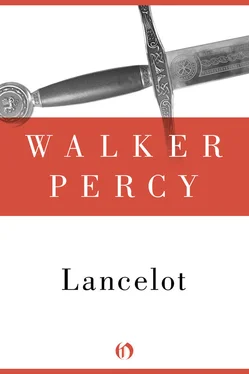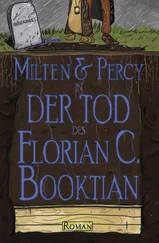We were on the floor. My thighs clasped his in a scissors grip.
“For Christ’s sake, what are you doing?”
“Nothing much.”
“That’s something I’d like to talk about,” he said panting hard yet speaking quickly and sincerely.
“What?”
“The absurdity of life. I’ve sensed you were into that.”
“Ah.”
“What?”
“Yes,” I said marveling over his actor’s gift of getting onto the way people talk. For I could recognize my voice in his, the flat giddy musing tone. He had observed me after all. Were we both drunk on methane or was it the case that in fact there were no “great moments” in life? Or both?
“Let’s talk. There’s one thing I always wanted to ask you.”
“Yes?”
“It has to do with something I’ve always desperately wanted in my life. I think you want it too.”
“Yes?”
“I want—”
We’ll never know what he wanted because his head was bending back and I was cutting his throat, I think. No, I’m sure. What I remember better than the cutting was the sense I had of casting about for an appropriate feeling to match the deed. Weren’t we raised to believe that “great deeds” were performed with great feelings — anger, joy, revenge, and so on? I remember casting about for the feeling and not finding one. Yet I am sure the deed was committed, because his voice changed. His voice dropped a foot from his mouth to his windpipe and came out in a rush, not a word, against my hand holding the knife. He was still under me and there was no feel of the heat of blood on my hand, only the rush and bubble of air as the knife went through the cartilage. I held him for a while until the warm air stopped blowing the hairs on the back of my hand. Yes, I feel certain that is what happened.
Standing by the bed, I gazed down at Margot. I do not remember the storm. She was not dead, not even unconscious. She was watching me, I think. The kerosene light made her cheekbones look wide, an Indian’s cheekbones. Her eyes were pools of darkness. They were open, I think. How could I be sure? I sat on the bed and with my arm across her put her cheek to my face. She was breathing. When she blinked, her eyelashes stirred the air against my cheek. In the midst of the hurricane I felt this minuscule wind her eyelashes made against my cheek. She said something. I felt her diaphragm move under my arm.
“What?”
“What are we going to do?” She spoke in my ear. “Is he—?”
“Yes.”
“Oh no,” she said in simple dismay as if Suellen had dropped her best Sèvres vase.
Margot, unlike me, had a feeling but not a remarkable one. It was dismay that things had gotten out of hand. Perhaps the house had begun to break up under the force of the wind. We had better do something about it.
“What are we going to do?”
“We?”
“You.”
“I don’t know.”
“Oh oh oh,” she said, taking one hand in the other and actually wringing it. “Is there anything I can do? Oh my God.”
“You could have.”
“Me. Just me?”
“Yes.”
“Why me?”
“Because I loved you.” That was true enough I knew even though I couldn’t remember what it was to love her.
“Loved? Love?” she asked.
“Because you were the only person who knew how to turn it all into love.”
“Love?”
“Sweetness dearness innocence singing laughing. ‘Love.’”
“Laughing?”
“That may have been your secret. You had a way of laughing.”
“Yes, I know. I’ll tell you what.”
“What?”
“Take your weight off me a little. I can’t breathe.”
“Neither can I. I’m not on you. It’s not the weight.”
“Oh, God. What is wrong? I can’t breathe.”
“Don’t worry about that. It’s the storm.”
“I tell you what, Lance.”
“What?”
“Let’s go away.”
“Where?”
“Anywhere. We can start a new life. I’m the only one who can make you happy.” It is strange but she spoke offhandedly now, as if nothing mattered a great deal. She too knew that there are no longer any “great historical moments.” She even took hold of the fabric of my hunting jacket and in her old way plucked a loose thread from it.
“That’s true.”
“I know that I know how to and you know that I know how to.”
“Yes.”
It was true.
We must have been poisoned by the methane because the roaring of the storm was inside my head and I could hardly hear her. She was delirious. She was talking again, but not even to me any longer, about being a child in the Texas countryside and walking to town Saturdays and taking her good shoes along in a paper bag. She would change shoes at the bridge and hide the old shoes in a culvert.
“I’m nothing—” she began. “What’s the matter with me?”
“What?”
“That’s what you never knew. With you I had to be either — or — but never a — uh — woman. It was good for a while. Oooh. Everything’s gone black. I’m dying.”
“No. The lamp went out.”
I sat on the bed thinking: How could the lamp go out? To this day I don’t know. Perhaps the wick was too low.
“Wait,” I told her and crawled on all fours to get it. Why did I say that to her? Wait. Because I wanted her to tell me how we could do it, start all over again? But not in a serious way. Yes. I was delirious too. I had forgotten about the methane and was thinking of planning a trip with her.
Before I lit the lamp, I sat on the floor, the lamp between me and the bed. my back against the outer wall.
“Do you really think—” I said, turning up the wick, and struck the match. For a tenth of a second I could see her in the flaring, lying on her side like Anna, knees drawn up, cheek against her hands pressed palms together, dark eyes gazing
Without a sound the room flowered. All was light and air and color and movement but not a sound. I was moved. That is to say, for the first time in thirty years I was moved off the dead center of my life. Ah then, I was thinking as I moved, there are still great moments. I was wheeling slowly up into the night like Lucifer blown out of hell, great wings spread against the starlight.
I knew everything. I even knew what had happened. Belle Isle had blown up. Why, I wondered, wheeling, hadn’t Raine’s room blown first? Was it because the duct was much smaller there or because I had left the chimney on the lamp?
I must have been blown through the wall, with the wall, because I came down on the outer sloping thicket of the great oak where the limb swept to the ground, touched, and came up again. When I came to myself, the fire was hot against my cheek. But there was no great inferno. The roof and upper floors were gone and what flame there was was blown flat and in places separate from the building like the flame of a Bunsen burner. The south wind of the hurricane blew the heat away from me. I felt myself. Nothing was broken. I looked at myself. My hand and shoulder were bloody. I did not feel bad. I stood up, for some reason put my hands in my pockets, and walked up the front steps as I had done ten thousand times before. The heat, carried away by the wind, was not great. Perhaps I had been unconscious a long time. Most of the walls of the ground floor were down. There was no second floor.
What did you say? How did I get burned?
I had to go back to find the knife.
WHAT A BEAUTIFUL DAY! Don’t you think so? The last day of the hurricane season. All danger of hurricanes past. The morning sun bright and high refracted through the clear crystal prism of northern air with that special moderation, the promise of warmth, of fine November days in New Orleans. Everything is mild and unexceptional here, isn’t it? even the weather. By eleven o’clock the winos on Camp Street will be creeping out of their holes and stretching out or curling up like cats in sunny doorways to take a little nap. Not a bad life.
Читать дальше












